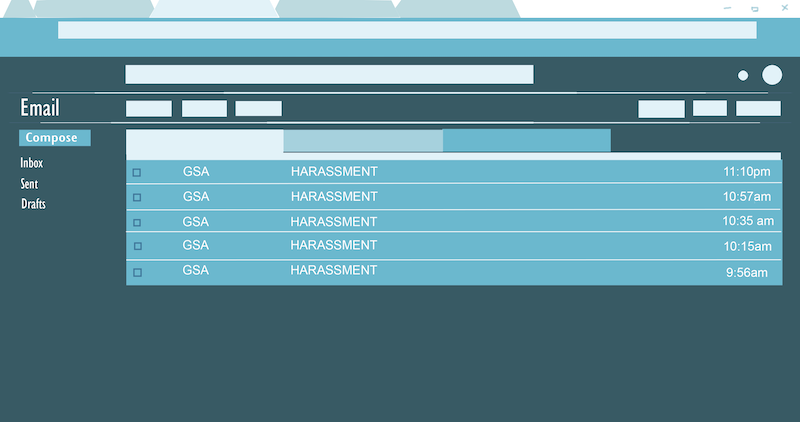Former GSA president files case against GSA for discrimination and harassment from former directors
A former president of Concordia’s Graduate Student’s Association (GSA) is filing a civil rights complaint against the organization and some of its directors for harassment and discrimination.
During his year-long term as the organization’s president, Alex Ocheoha said he was subjected to hostile treatment from GSA directors starting from the organization’s first council meeting in June 2015.
“They were addressing me in a disrespectful manner, they were shouting at me, they were… trying to cause trouble at the meetings,” he said.
The GSA is made up of a five-person executive team and 20 directors who vote in the organization’s council.
After the first council meeting, Ocheoha said he thought the hostility might have stemmed from a small misunderstanding of how the GSA is supposed to function. “I thought it was something we could talk over and clear it up,” he said. “We tried to have a meeting, but [the directors] didn’t agree to come… They were not interested in coming.”
Ocheoha said the directors continually found ways to prevent him from fulfilling his mandate as GSA president and that their email communications felt like racial and cyber harassment.
“It was a terrible period for me,” he said. “I had never experienced anything like that before in my life.”
In emails obtained by The Concordian, GSA directors responded to Ocheoha’s complaints of harassment in emails shared with everyone in the organization. On Oct 29, Ocheoha received a response to an email from then-GSA director Rahul Kumar—the whole GSA organization was cc’d on said email. It read, “What do you want to prove from this, Alex? That you are full of shit?”
When Ocheoha pointed out that this was an example of ongoing harassment, another former director, Mathilde Ngo Mbom, responded: “Aaaaw the grown-up man feels harassed! Take your balls out of the pockets, put them where (i.e: between your legs) they should be and stop being a crying baby.”
“The next time you show some sense of mental disorder, I’ll send these emails to the police and they will request that you meet a psychiatrist (by force) because you need one,” she wrote.
In an interview with The Concordian on Nov. 27, Ngo Mbom expressed regret for the tone of the email. “We were passionate,” she said. “We wanted what’s best for students. I was too forceful, but I’m glad I fought for the students, not for the executives.”
“I’m not saying we had the right to say what we did,” she added.
Ngo Mbom said the tone in those emails resulted from workplace tension caused by Ocheoha. She said even before the Oct. 29 exchange, Ocheoha would take any criticisms of his role as harassment and threaten to sue the GSA directors.
Those threats, Ngo Mbom said, caused fear in many of the GSA’s directors. Many of them were international students and she said international students actively avoid getting into legal trouble which could affect their study visa. This inhibited directors from working with him, she said.
“At a certain point, you don’t want to push because of the complaint of harassment,” said Ngo Mbom. “If [Ocheoha] says no, you back off.”
Kumar said the tension had been building up, “and I snapped. It wasn’t mature and I regret that.”
Both Kumar and Ngo Mbom said they apologized to Ocheoha for the comments they made, but that he didn’t seem willing to work with them afterwards. Instead, they said it felt like Ocheoha spent the rest of the year trying to build a legal case against them.
However, Ocheoha said there were never formal apologies for the emails sent on Oct. 29.
Ocheoha said the harassment also manifested itself through the organization’s newly-created oversight committee. The committee’s role was to review work reports from executives and recommend to the GSA council whether or not executives were fulfilling their work responsibilities and deserved their full bursary. Both Kumar and Ngo Mbom were members of that committee.
Both former directors said Ocheoha inadequately answered questions they had about his reports.
“He took asking him why he couldn’t do a task as harassment,” said Kumar.
Rupinder Kaur, who served as the GSA’s vice president of academic and advocacy until December 2015, said several directors would fight Ocheoha at every turn. “Whatever he said, they had to disagree,” she said. “He wasn’t getting any kind of cooperation.”
Kaur found the whole environment too stressful for her, which is why she left before the end of her term. “The environment was very unhealthy,” she said.
Ocheoha sought help from the university’s Office of Rights and Responsibilities as well as Concordia’s dean of students. While Ocheoha said the ORR wouldn’t help because the GSA is it’s own independent organization, he said the dean of students helped arrange a reconciliatory meeting— which saw little turnout.
The GSA itself has no internal body or organization to handle complaints like this, said Ngo Mbom.
“There’s no system,” she said, adding that, in 2014, the GSA directors made a list of recommendations to deal with this type of tension. “Even if there was, I’m not sure it would have been enforced.”
“There were internal difficulties, internal infighting even before Alex was elected,” said Fo Niemi, the director of the Centre for Research-Action on Race Relations, which is representing Ocheoha in the complaint. “When Alex was president of the GSA, he experienced harassment by some directors of the GSA. Even if there was an advocacy person there, conflict of interests could’ve arisen because it’s so internal. It’s an internal mess.”
